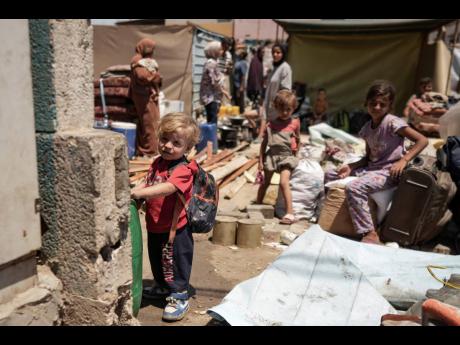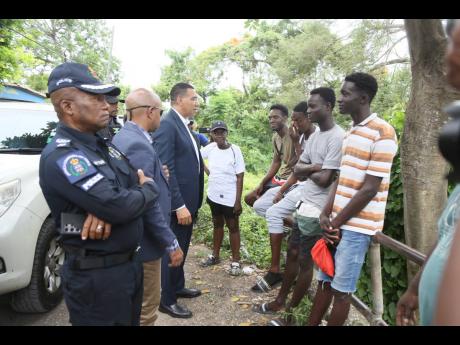Imani Tafari-Ama | Of martyrs and gangs: What is a life worth?
The Israeli army bombed the al-Tabin School in Gaza on Saturday, August 10, killing about a hundred Palestinians and injuring many more. The world is now numb to the ongoing genocide. In the aftermath, 18 kilogrammes of body parts is all that a father could collect as the remains of his son. Another father found body parts but not his daughter’s missing head. The types of bombs being used in the strike shatter bodies and disintegrate flesh. This makes the United States of America (USA), suppliers of the weapons, complicit in the mass death of 40,000 people at last official count.
The Israelis claimed that Hamas fighters were using the dilapidated school where civilians were sheltering as cover for their resistance activities. Even if true, does this justify the collective punishment of the civilian population? In outrage, Algeria called for an emergency meeting of the United Nations’ (UN) Security Council on Tuesday, August 13. Passions ran high in that session as various representatives called for a ceasefire to end the war now in its tenth month.
Ceasefire talks are at a stalemate, and tensions are at an all-time high in Iran and Lebanon, following the assassination of Ismail Haniyeh, the Hamas head and lead ceasefire negotiator in Iran. Haniyeh was attending the inauguration of the newly minted Iranian prime minister. This killing followed closely on the heels of the murder of top Hezbollah commander Fuad Shukr in Beirut nearly two weeks ago. In a diplomatic turn, Iran is applying pressure for a ceasefire in Gaza as a deterrent to escalating hostilities while still promising harsh retaliation.
HAMSTRUNG
The UN is hamstrung, unable to protect the sanctity of Geneva conventions that provide guidelines for safeguarding human life under war conditions. As part of the violence, Palestinians are being herded, multiple times, across about 85 per cent of the narrow Gaza Strip. This exhausting displacement is part and parcel of the dehumanisation strategy, which prevents the besieged population from accessing electricity, water, food, medical care, and security.
In parallel time in Jamaica, the killing of eight persons and the wounding of nine in Cherry Tree Lane, Four Paths, in Clarendon on August 11 has elicited shocked responses from politicians and the public alike. It is terrible to absorb the implications of this mass killing. As desensitised as the society has grown to violence over the years, it is frightening to realise that some perpetrators have no qualms about hurting so many persons in one day. From reports, it is apparent that the murders were committed by the same offenders.
On the streets, the jungle justice code has determined that the tears shed for the innocent are hotter than for guilty parties. What cycle of revenge could be at the root of such brutal actions?
The standard speeches of outrage were predictable. The prime minister noted that “anyone who was in any way involved in the act of terror in Clarendon will be brought to justice. This act of terror and any similar act is an attack on every Jamaican. The security forces have been instructed to continue the all-out assault on all gangs across Jamaica. We are a nation of law and order, and the perpetrators and other criminal organisations cannot be allowed to escape the rule of law.” He noted that the present number of gangs was about a third of what it was last year, now numbering over 200.
The cynics among us might wonder, hasn’t violence been normalised for decades now? Why this angst and handwringing then when an average of 1,400 murders are recorded every year? That is about four persons per day. There seems to be a relative dumbness when the annual death toll is tallied in the hundreds.
In 2020, Deputy Prime Minister and Minister of National Security Dr Horace Chang remarked that the Government was responsible for a reduction in gangs. He noted, however, that the security forces could not effectively tackle the problem because “in many communities across the island, gang members enjoy strong community support, which makes it difficult to isolate them. There has been a significant increase in the number of gang members identified, apprehended, and prosecuted.”
KNOWN TO GOVERNMENT
The gangs are, therefore, known to the government authorities. As Chang elaborated, “Three hundred and twenty-three or 83 per cent of the total criminal gangs in operation were classified as ‘first generation’ gangs by virtue of their loose and unsophisticated leadership. These gangs are also identified by the fact that their main focus was on turf protection and control for financial gains.”
This analysis must mean that gang composition, in terms of members, is known to whoever is counting them in the National Intelligence Bureau (NIB). Classifying gangs and determining their reduction in numbers is used as an indicator of improvement in the national-security situation.
What does gang reduction look like? Does that mean that the police have carte blanche for extrajudicial killings? Does that justify the dehumanisation of the perpetrators of violence to the extent that eliminating them can be seen as the solution to the outlaw practices? What about the human rights of said perpetrators? The fact that you are presumed to have done something wrong and that you are in a gang and that you have been defined as terrorists is a familiar narrative. What role do politicians play in this drama?
The shocking scenario in Four Paths, Clarendon, has correspondence in the memories hoarded by citizens in communities like Rockfort, August Town, Salt Spring, and Spanish Town. For a long time, despite all the efforts of violence interrupters, researchers, and policymakers, relentless violence has taken a huge toll on citizen security.
Worldwide, violence is a familiar problem for which there is insufficient political will to escalate the process for creating sustainable solutions. Weapons of human destruction are intentionally created for killing people for the huge profits that accrue to manufacturers.
Five years shy of 2030, the landmark set by the UN for achieving certain benchmarks for sustainable development, what strategies has the Jamaican Government crafted for subverting the conditions of underdevelopment that give rise to gangs? What if the state created an amnesty for guns, tied to land ownership and social rehabilitation for perpetrators? Encouraging people to choose leaders based on performance rather than intimidation, ignorance, and short-term scarce benefits and spoils would go a far way to easing the revenge cycle tensions.
In Jamaica, creating desperately needed employment for persons who depend on being gangsters for survival should substitute for talk about eliminating gangs. A shift in perspective means ceasing to regard gangsters as mere objects for police target practice. The restorative justice mechanisms already in place in the Ministry of Justice should be energised to encourage warring factions to face the intergenerational fallout of their conflicts in a peaceful way.
Peace talks are once again taking place in Doha, Qatar. However, the US approval of $20 billion more weapons for Israel shows the superpower’s complicity in undermining the peace deal. The charade of peace is thus unrelated to the underlying muscle of violence.
Imani Tafari-Ama, PhD, is a Pan-African advocate and gender and development specialist. Send feedback to i.tafariama@gmail.com and columns@gleanerjm.com.


